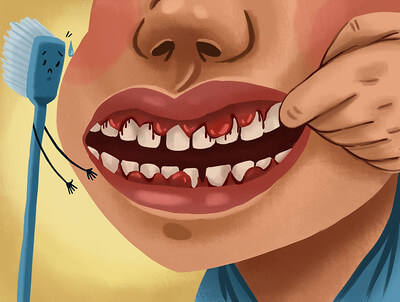Gum Disease Prevention: Taking Care of Your Dental Health
Gum disease, also known as periodontal disease, is a common oral health issue that affects millions of people worldwide. It is a progressive condition that can lead to serious consequences if left untreated. The good news is that gum disease can be prevented with proper care and attention to your dental health. In this article, we will explore effective strategies for gum disease prevention, ensuring you can maintain a healthy smile for years to come.
Understanding Gum Disease
Before we delve into prevention, it’s important to understand what gum disease is and how it develops. Gum disease occurs when bacteria in our mouths form a sticky film called plaque on our teeth. If not removed through regular brushing and flossing, plaque can harden into tartar, which can only be removed by a professional dental cleaning.
As tartar accumulates, it irritates the gums and causes inflammation. This initial stage of gum disease is called gingivitis. If left untreated, gingivitis can progress into periodontitis, a more advanced form of gum disease. Periodontitis can lead to gum recession, bone loss, and even tooth loss.
Maintaining Good Oral Hygiene
The foundation of gum disease prevention lies in maintaining good oral hygiene practices. Here are some essential habits to incorporate into your daily routine:
1. Brushing: Brush your teeth at least twice a day using a soft-bristled toothbrush and fluoride toothpaste. Ensure you clean all tooth surfaces, including the gumline, using gentle circular motions.
2. Flossing: Don’t forget to floss! Flossing helps remove plaque and food particles from between your teeth and along the gumline. Make sure to floss at least once a day, gently sliding the floss in a C-shape around each tooth.
3. Mouthwash: Rinse your mouth with an antimicrobial mouthwash after brushing and flossing. This helps kill bacteria that may remain in your mouth and freshens your breath.
Healthy Lifestyle Choices
Apart from maintaining good oral hygiene, certain lifestyle choices can significantly impact your gum health. Consider the following:
1. Healthy Diet: Opt for a balanced diet rich in fruits, vegetables, whole grains, and lean proteins. Limit your consumption of sugary snacks and beverages, as they contribute to plaque formation and increase the risk of gum disease.
2. Tobacco Avoidance: Smoking and chewing tobacco are harmful to your oral health. They not only stain your teeth but also weaken your immune system, making it harder for your body to fight gum infections. Quitting tobacco is one of the best things you can do for your overall dental health.
3. Stress Management: Chronic stress can weaken your immune system, making you more susceptible to gum disease. Find healthy ways to manage stress, such as exercise, meditation, or engaging in activities you enjoy.
Regular Dental Visits
Regular visits to your dentist are crucial for gum disease prevention. Your dentist can detect early signs of gum disease and provide appropriate treatment. They will perform a thorough examination of your gums, measure the depth of your gum pockets, and clean your teeth to remove any plaque and tartar buildup.
Additionally, your dentist can offer personalized advice on oral hygiene techniques and provide professional teeth cleanings, which go beyond regular brushing and flossing. Aim to visit your dentist at least every six months, or as recommended by your oral healthcare professional.
Frequently Asked Questions (FAQs)
1: Can gum disease be reversed?
The early stage of gum disease, gingivitis, can be reversed with proper oral hygiene practices and regular professional
cleanings. However, once gum disease progresses to periodontitis, it cannot be completely reversed, but its progression can be slowed down and managed with appropriate treatment and ongoing care.
2: Are there any symptoms of gum disease that I should watch out for?
Yes, there are common signs of gum disease, including red, swollen, or tender gums, bleeding gums, bad breath, receding gums, loose teeth, and changes in your bite. If you notice any of these symptoms, it’s important to consult your dentist for a proper diagnosis and treatment.
3: Are there any risk factors that increase the likelihood of developing gum disease?
Yes, certain factors can increase your risk of gum disease, such as poor oral hygiene, smoking or chewing tobacco, diabetes, hormonal changes (such as during pregnancy or menopause), certain medications, genetics, and a weakened immune system.
References
1. American Academy of Periodontology. “Gum Disease Information.”
3. American Dental Association. “MouthHealthy: Gum Disease.”
Remember, prevention is always better than cure when it comes to your dental health. So take charge of your oral care today and enjoy a beautiful, healthy smile for life.



